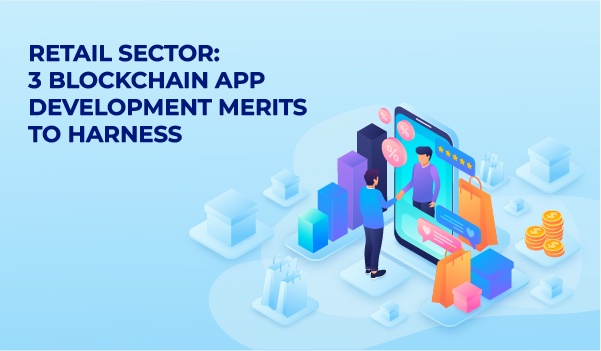Blockchain for business uses a public, immutable ledger that only authorized users may access. As a result, network members have control over what data each organization or member may view and what actions each member may take. This confidence is based on blockchain technology's increased security, transparency, and immediate traceability.
Besides problems with trust, Blockchain has other benefits for business, like cost savings via increased speed, efficiency, and automation. By reducing paperwork, errors, and the need for middlemen or third parties to authenticate transactions, Blockchain also significantly reduces overhead and transaction expenses.
Blockchain technology has become increasingly popular in recent years thanks to its ability to enhance these business pillars. While its initial use was in cryptocurrencies, the technology has applications in several other industries, including retail. This article will explore the benefits of inculcating Blockchain App Development in the Retail Industry.
The Benefits of Implementing Blockchain in Retail Software Development
Efficiency
One of the most significant advantages of developing blockchain-backed apps in retail is its ability to enhance efficiency. Blockchain provides a decentralized system that eliminates the need for intermediaries in transactions. This means that transactions can be conducted more quickly, securely, and at a lower cost. The technology can also be used to automate processes, such as inventory management and supply chain management. This automation helps retailers reduce the time and resources spent on manual processes and focus on more critical business areas.
Conventional paper-based processes demand third parties to mediate. Additionally, they are time-consuming, liable to human error, and inefficient. Automating these processes with blockchain technology allows transactions to be completed more swiftly and efficiently. Blockchain app development in retail may encourage holding documentation and transaction information together, eliminating the necessity for paper exchange. Evidently there is no obligation to reconcile several ledgers, which calls for a smooth clearing and settlement cycle.
Transparency
Another advantage of Blockchain for retail software development is its ability to enhance transparency. Blockchain technology provides a permanent and tamper-proof record of all transactions. This means that retailers can easily track the movement of products from the manufacturer to the end user. The technology can also ensure compliance with regulations and standards, such as fair trade, ethical sourcing, and sustainability. With Blockchain, retailers can be more transparent about their business practices, enhancing their reputation and increasing customer loyalty.
Without Blockchain, every company needs to maintain a different database. Blockchain uses a distributed ledger, guaranteeing that data and transactions are captured uniformly everywhere. Full transparency is provided since every network user with permissions can see the same data simultaneously. In addition, all transactions are time- and date-stamped records with immutability. Thanks to this, members may access the whole transaction history, almost eliminating the possibility of fraud.
Trust
Blockchain app development in retail also enhances trust. The decentralized nature of Blockchain means that transactions are conducted without intermediaries, reducing the risk of fraud and error. The technology also provides a secure and transparent way to verify the authenticity of products. This is especially important in industries such as luxury goods and pharmaceuticals, where counterfeit products are a significant problem. With Blockchain, retailers can assure customers that their products are genuine, which can help build trust and loyalty.
Blockchain technology can alter how your sensitive and vital data is perceived fundamentally. Blockchain creates an immutable record that is end-to-end encrypted to stop fraud and other illicit conduct. By employing permissions to restrict access and anonymizing personal data, privacy issues can also be solved on the Blockchain. To prevent hackers from accessing data, information is kept across a network of computers instead of on a single server.
Future of Retail with Blockchain Technology
In conclusion, Blockchain technology has several benefits for the retail industry. It enhances efficiency by automating processes and reducing the time and resources spent on manual tasks. It also improves transparency by providing a tamper-proof record of all transactions, ensuring compliance with regulations and standards.
The future of retail will also see Blockchain directly communicating provenance information to customers. Furthermore, traceability data can highlight any supply chain's weak links, such as possible loading dock storage locations for items that are being transported.
Transactions can also be automated via "smart contracts," increasing productivity and quickening the process even more. The following phase of an exchange or procedure is automatically initiated after pre-specified requirements are satisfied. Smart contracts reduce the requirement for human intervention and depend less on third parties to verify that the terms of a contract have been followed.
Finally, it enhances trust by providing a secure and transparent way to verify the authenticity of products, reducing the risk of fraud and error. As the retail industry becomes increasingly competitive, blockchain technology can help retailers stay ahead of the curve and provide customers with the transparency and security they demand.


No comments yet